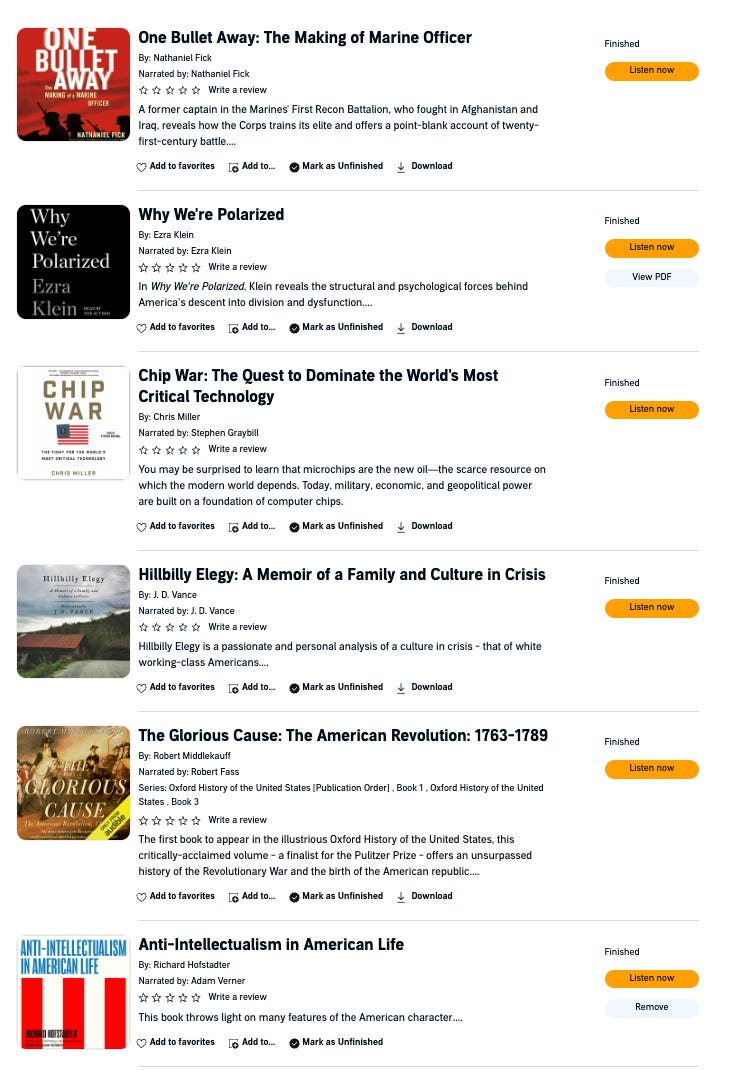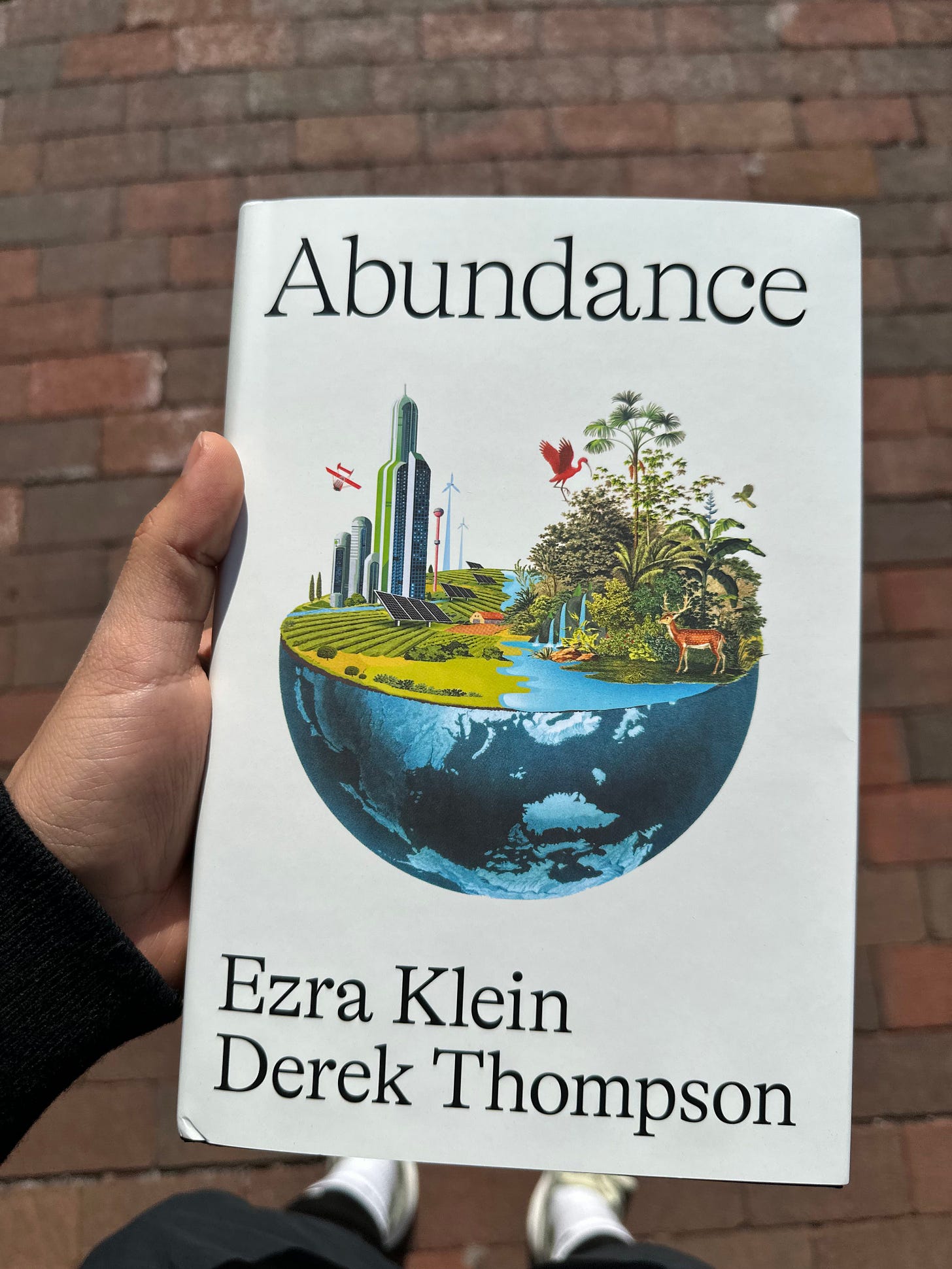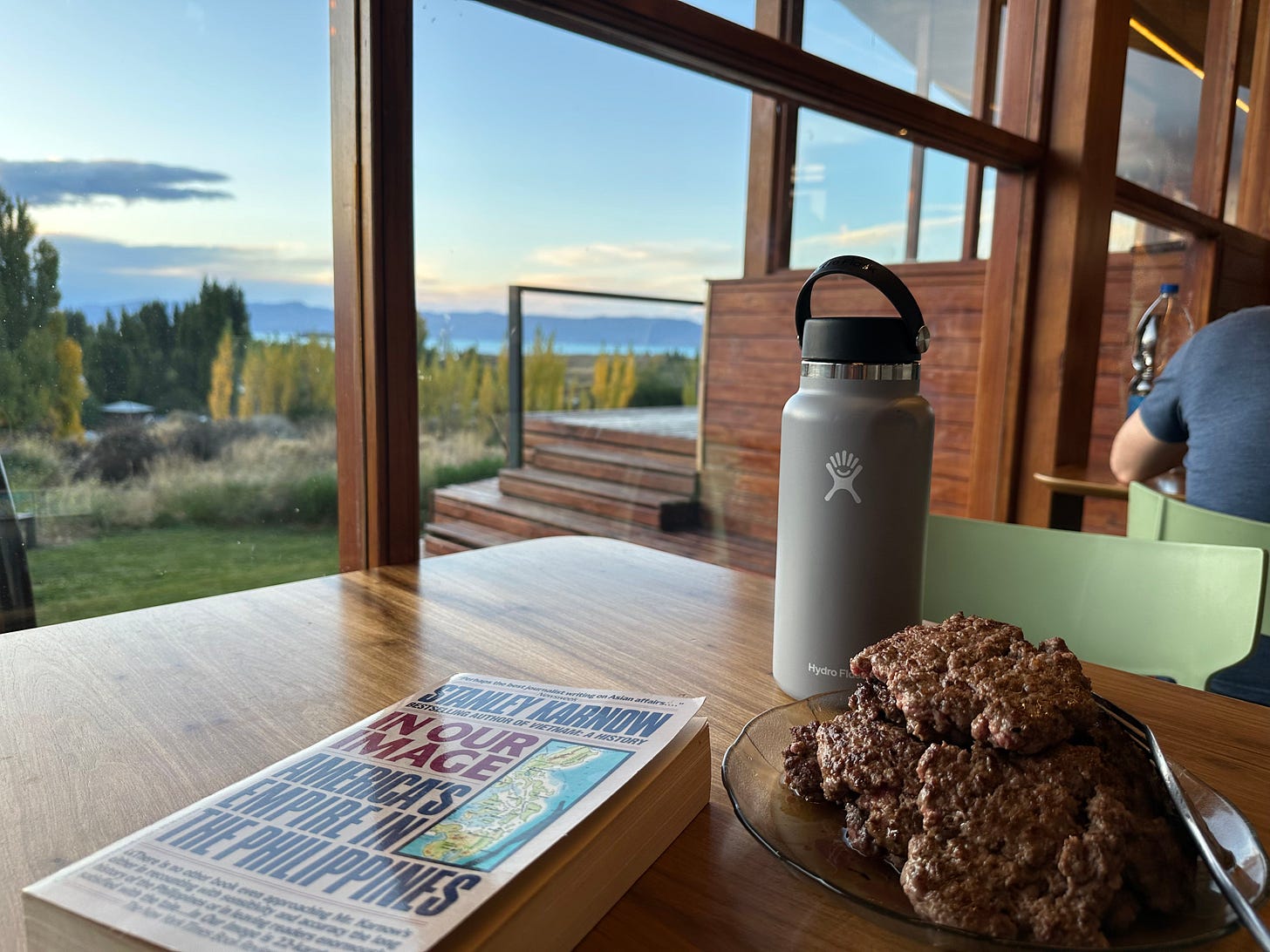Hello from the library!
It’s reading week (the week after classes end and before final exams), and I want to take a quick study break, so here’s an update on what I’ve been reading for fun this spring.
Cuba: An American History by Ada Ferrer
Started this one in January and finished it around March. I did not realize how closely intertwined America and Cuba have been. During the Seven Years’ War, a group of American soldiers from New York helped the British seize Havana. Before the Civil War, lots of Southern politicians wanted to bring Cuba into the Union as a slave state. In 1853, William R. King of Alabama took the vice-presidential oath on a plantation in Cuba! (And then died 45 days later from tuberculosis.)
Anti-Intellectualism in American Life by Richard Hofstadter
As you can see, most of the books I read this spring are books I listened to on Audible while I was in the gym or running.
Anti-Intellectualism in American Life is the one audiobook that I wish I had read in print, and I will probably buy and re-read the paperback over the summer. It’s a great book, but Hofstadter uses a sort of mid-20th-century prose style that is perfectly understandable on the page but doesn’t translate the best to audio, at least in my opinion. It’s an especially relevant read in our post-pandemic moment, where valid criticisms of overreach by public-health experts have translated into a broadside against intellectuals writ large in a way that I think is unconstructive (such as recent university funding cuts). If you read one book from this list, I’d recommend this one.
One Bullet Away: The Making of a Marine Officer by Nathaniel Fick
This was recommended to me by a friend’s older brother. Fascinating story and by far the most engaging book I read this spring. I think I finished this one in three or four days.
Why We’re Polarized by Ezra Klein
Ezra Klein does a great job of summarizing a lot of research on how partisan identities are formed and reinforced and how they shape our attitudes towards politics. I do think that some of his analysis of Trump is a bit outdated, though. Klein argues that Trumpism is fundamentally a movement of white voters who are scared of demographic change. But since 2020, we’ve seen Donald Trump make massive gains with nonwhite voters and particularly with Latinos.
The Glorious Cause: The American Revolution: 1763-1789 by Robert Middlekauf
I’m slowly working my way through the Oxford History of the United States series. I liked that Middlekauf put a little less emphasis on the play-by-play of specific battles that McPherson does in Battle Cry of Freedom, which I felt got kind of bogged down in the middle with a lot of military history that was sometimes hard to follow.
Hillbilly Elegy: A Memoir of a Family and Culture in Crisis by JD Vance
JD Vance might be president one day, so I thought it wouldn’t hurt to understand his thinking better. He’s a smart guy. This isn’t a novel observation, but what struck me is how different he sounds in his book. Towards the end, there’s this segment where he talks about how someone he grew up with in Ohio went on Facebook to blame Obama for the economy, even though he had gotten fired from work for not showing up half the time. Consistently, Vance argues that government policies aren’t enough to help the people he grew up with because many of their problems are cultural. That’s not at all what he says now.
Chip War: The Quest to Dominate the World’s Most Critical Technology by Chris Miller
I listened to this one last week in the gym. Very interesting and very relevant.
Abundance by Ezra Klein and Derek Thompson
This book has sparked a lot of discourse, but to be honest, I was pretty underwhelmed by it. I’m probably not the target audience because I’ve been reading about abundance-type ideas for a while now. Klein and Thompson are focused on persuading people to their left, but I’m not sure they’ve been very successful there. I think it’s more important to persuade regular voters who have regular concerns like “if we build more housing, won’t that make traffic worse and parking harder to find?” Klein and Thompson admit in the first chapter that they’re not the best messengers for that. But then, where does that leave us?
In Our Image: America’s Empire in the Philippines by Stanley Karnow
I read this over spring break while I was in Argentina. My big takeaway from this book is that the United States never really had a plan for the Philippines. Teddy Roosevelt bullied William McKinley into conquering the islands, but neither Teddy nor McKinley seemed to have an actual plan for what to do with them. And that seems to have been the theme the entire time America ruled the Philippines, right up to when we gave them independence.
What I’m reading and listening to now
I won’t be reading much of anything until I’m done with exams, but here is a list of books I’ve started and plan to finish this summer.
What Hath God Wrought: The Transformation of America, 1815–1848 by Daniel Walker Howe. Another one in the Oxford series. I’ve gotten through roughly the first 200 pages since I got back from spring break, but had to put this one on hold once schoolwork picked up.
Freedom from Fear: The American People in Depression and War, 1929-1945 by David M. Kennedy. Oxford again. I listened to the first two hours of this on 1.5x speed while I was running the Newport, Rhode Island, half marathon two weeks ago. I’ll probably come back to this one after I finish Howe.
The Age of Reform by Richard Hofstadter. I listened to the first half hour of this and then realized that I’d probably rather read this in print.
The Anarchy by William Dalrymple. Started listening to this on Tuesday. Unfortunately, my AirPods seem to be broken—they keep making a high-pitched squeaking sound every time I put them in—so I haven’t been able to listen to my audiobooks while I work out, which is mildly frustrating. Hopefully, the nice people at the Apple Store can help me sort that out.
Master of the Senate by Robert A. Caro. This one was a birthday present from my girlfriend, and I think this is the paperback I’ll start after I finish Howe.
Guns, Germs, and Steel: The Fates of Human Societies by Jared Diamond. I was assigned roughly the first two-thirds of this book for a class I took on agriculture this semester. Really enjoyed it, so I plan to finish it once my exams are done.
India After Gandhi: The History of the World's Largest Democracy by Ram Guha. Similarly, I read roughly the first two-fifths of this book for a class I took on the history of India and Pakistan since 1947; hopefully, I can finish it over the summer.
Now back to studying.




